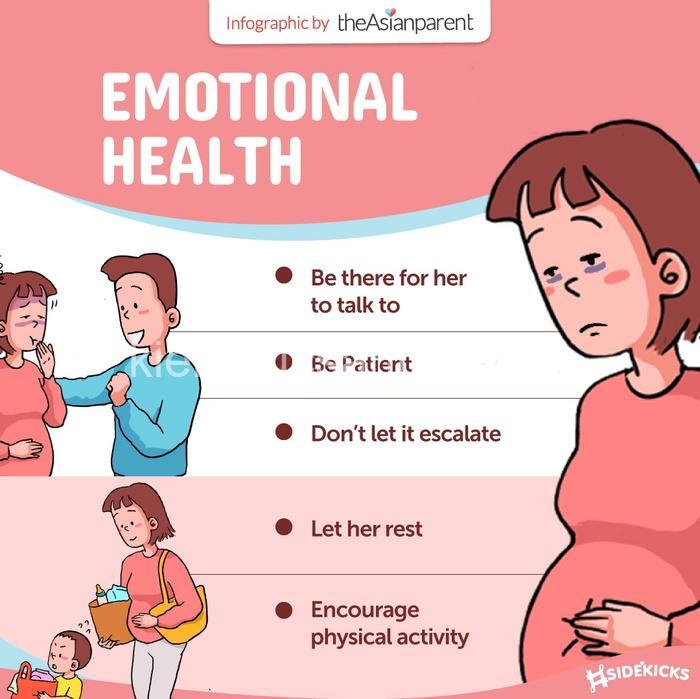
Pregnant & Family Expectations: Communication, Boundaries & Self-Care. In today’s article, kienthucsannhi.com will explore with you in the most detailed and complete way. See now!
Open Communication: The Foundation for Understanding and Respect
Pregnancy is a period of significant life changes, and family members often have expectations about how you should act, behave, and make decisions. These expectations can range from traditional gender roles and cultural norms to personal beliefs and values. While their intentions may be good, it’s crucial to remember that pregnancy is your journey, and your experience is unique. Open communication can help build a bridge of understanding and respect between you and your family.
Start by acknowledging and defining the expectations that family members may have. Are they expecting you to follow specific birth practices, take on traditional household responsibilities, or adhere to certain parenting philosophies? By identifying these expectations, you can begin to address them openly and honestly.
Next, communicate your needs and preferences directly. Use “I” statements to express your feelings and desires, providing specific examples and scenarios to clarify your viewpoint. For instance, “I understand you’re excited about being a grandparent, but I need some time to adjust to being a new mom before welcoming visitors.” Encourage open dialogue and active listening, allowing family members to express their own thoughts and concerns. This creates a safe space for mutual understanding and respect.
Finding common ground is essential in navigating family dynamics. Focus on shared values and goals to foster a sense of unity. For example, if you and your family value tradition but disagree on specific birth practices, explore ways to incorporate elements of tradition while respecting your personal preferences. Open communication fosters understanding and allows you to build a stronger bond with your family.

Setting Boundaries: Protecting Your Well-being and Creating Space
Pregnancy is a time of intense physical, emotional, and mental change. It’s essential to create a supportive environment where you can prioritize your well-being. This often involves setting boundaries, which can be a challenging yet essential step in navigating family expectations.
Defining what’s acceptable involves establishing clear limits on behavior and interactions. Consider what kind of physical contact is comfortable for you, how much personal space you need, and what type of visits you’re open to. Similarly, set emotional boundaries around sharing information, expressing opinions, and engaging in sensitive conversations. Time boundaries might involve setting limits on visit durations, scheduling visits at convenient times, or respecting your need for personal time.
Communicating boundaries respectfully is key. Use assertive language and clear statements to express your needs. Learn to say “no” without feeling obligated or guilty. Explain the reasons behind your boundaries, ensuring that your loved ones understand your motivations. Reframing requests and offering alternatives can also be helpful. For example, instead of saying “I don’t want visitors this week,” you could say, “I’m focusing on rest this week, but would love to see you next week.”
Enforcing boundaries consistently is crucial. Reaffirm your limits when necessary, and be prepared to politely but firmly redirect conversations or interactions that cross your boundaries. It can also be helpful to seek support from trusted friends or family members who can validate your feelings and offer encouragement. If you’re facing significant challenges in setting or maintaining boundaries, consider seeking professional guidance from a therapist or counselor.
Prioritizing Self-Care: Nourishing Your Body and Mind
Pregnancy is a time of significant physical and emotional change, and self-care is essential to maintaining your well-being. This means listening to your body, nourishing yourself with healthy food and rest, and engaging in activities that promote mental and emotional well-being.
Understanding the importance of self-care is crucial. It’s not selfish to prioritize your needs during pregnancy. It’s essential for a healthy pregnancy and a smooth transition to motherhood. Self-care encompasses various aspects of your well-being. Physical well-being involves nourishing your body with a balanced diet, getting enough sleep, and engaging in regular exercise, which can enhance your mood and energy levels.
Emotional well-being involves taking time for relaxation techniques such as meditation, mindfulness, or simply spending time in nature. Mental well-being involves seeking therapy, joining support groups, or engaging in self-reflection to manage stress and maintain a positive mindset.
Creating a self-care routine involves developing a plan that caters to your individual needs and preferences. Schedule time for activities that bring you joy and relaxation, and set realistic goals and expectations for yourself. Prioritize rest and recovery, understanding that your body is working hard to create new life.
Remember that seeking professional help is not a sign of weakness but a sign of strength. Prenatal care providers can address physical and mental health concerns, while therapists or counselors can provide guidance in managing stress and anxiety.
Building a Supportive Network: Finding Strength in Connections
Pregnancy is a transformative experience, and having a strong support system can make all the difference. This network of individuals can provide emotional and practical support, offering a sense of belonging and validation during this time.
Identifying your support system involves recognizing those who offer unconditional love and support. This could include your partner, close friends, family members, support groups, online communities, or social media groups. It’s important to surround yourself with individuals who understand your needs and are willing to offer a listening ear, a helping hand, or simply a warm embrace.
Leaning on your support system means reaching out for help when you need it. Share your concerns and challenges, asking for assistance with tasks or errands. Allow those in your network to offer encouragement and validation.
Creating a safe space involves nurturing relationships with people who respect your boundaries and validate your feelings. Choose those who will support your decisions and offer constructive feedback. A strong support system can be your lifeline during pregnancy, providing a sense of stability and security.
Managing Stress and Anxiety: Protecting Your Mental Well-being
Pregnancy can bring about a surge of emotions, including stress and anxiety. Recognizing the signs of stress and taking steps to manage it is essential for maintaining your mental well-being.
Recognizing the signs of stress involves paying attention to your body, emotions, and behavior. Physical symptoms of stress might include headaches, fatigue, muscle tension, digestive issues, or sleep disturbances. Emotional symptoms could manifest as anxiety, irritability, sadness, overwhelm, or difficulty concentrating. Behaviorally, stress might lead to changes in appetite, social withdrawal, substance use, or increased anger.
Employing stress management techniques can help alleviate stress and anxiety. Explore techniques like deep breathing exercises, meditation, mindfulness, or yoga. Engaging in physical activity such as walking, swimming, or dancing can also be beneficial. Creative activities like writing, painting, or listening to music can provide a calming outlet.
Seeking professional help when needed is crucial. If you’re struggling to manage stress and anxiety on your own, don’t hesitate to reach out to a prenatal care provider, therapist, counselor, or support group. These professionals can provide personalized strategies and guidance to help you navigate this challenging period.
Finding Resources and Information: Empowering Yourself with Knowledge
Having access to accurate and reliable information can be incredibly empowering during pregnancy. A wealth of resources is available to provide you with the knowledge and support you need.
Online resources offer a wealth of information and support. Reputable pregnancy websites, support groups, and forums provide a platform for connecting with other expectant mothers and sharing experiences. Articles, books, podcasts, and videos can offer insights on various aspects of pregnancy, childbirth, and postpartum recovery.
Local resources can offer personalized support and guidance. Prenatal classes, childbirth education workshops, and postpartum support groups provide opportunities to learn from experts, connect with other moms, and develop coping strategies. Community centers, libraries, and healthcare providers can also offer valuable resources and support.
Seeking professional guidance can provide personalized advice and support. Prenatal care providers, childbirth educators, doulas, and therapists can offer expert advice on a variety of pregnancy-related topics, including managing family expectations, coping with stress, and preparing for labor and delivery.
Navigating Cultural Differences: Bridging the Gap with Understanding
Family expectations can vary greatly based on cultural background. Birth practices, parenting styles, postpartum recovery, family involvement, gender roles, traditions, and religious beliefs can all influence how families approach pregnancy and motherhood.
Understanding cultural variations is essential for navigating family dynamics effectively. Take time to learn about the cultural traditions and values that influence your family’s expectations. Engage in conversations with your family members to understand their perspectives and motivations.
Openly communicating with family is vital for bridging cultural differences. Explain your own beliefs and preferences, respecting their perspectives and fostering open dialogue. Explore ways to incorporate elements of tradition while respecting your personal preferences.
Building a strong support system that understands and validates your experiences can help you navigate these cultural differences with confidence. Seek out individuals who can offer empathy, encouragement, and guidance as you navigate this complex terrain.
Creating a Positive Pregnancy Journey: Embracing the Journey with Self-Love and Confidence
Pregnancy is an incredible journey that deserves to be celebrated. Focus on the positive aspects of this experience, connecting with your baby, celebrating milestones, and enjoying the process.
Focusing on the positive involves shifting your attention to the joy and wonders of pregnancy. Take time to appreciate your body’s remarkable ability to create new life. Cherish moments of connection with your baby, whether through feeling its movements, hearing its heartbeat, or simply taking time for quiet reflection. Celebrate milestones, both big and small, as you embark on this exciting journey.
Building self-confidence is essential during pregnancy. Affirm your strength, resilience, and ability to navigate challenges. Trust your instincts, advocate for your needs, and celebrate your progress. Remember, you are capable and strong, and you have the power to create a positive and fulfilling experience.
Creating a positive environment involves surrounding yourself with supportive people and activities. Spend time with those who bring you joy and uplift your spirits. Engage in activities that nourish your body and soul. Create a space that reflects your values and promotes a sense of peace and well-being.
Seeking Professional Help: Addressing Complex Situations and Seeking Expert Guidance
Navigating family expectations during pregnancy can be challenging, and sometimes, you may need extra support. It’s important to recognize when you need professional help to manage complex situations, address challenging emotions, and ensure your well-being.
When to seek professional support involves recognizing signs of stress, anxiety, or conflict that you’re struggling to manage on your own. If you’re experiencing difficulty setting boundaries, managing family dynamics, or coping with negative emotions, it’s wise to seek guidance from a professional. If you’re feeling isolated, overwhelmed, or hopeless, don’t hesitate to reach out for help.
Finding the right professional involves identifying a therapist, counselor, or support group that aligns with your needs and preferences. Look for professionals who specialize in pregnancy, postpartum, or family therapy, offering a safe and supportive environment.
Benefits of professional support include gaining tools and strategies to manage challenges, improve communication skills, reduce stress and anxiety, and enhance your overall well-being. Seeking professional guidance can help you navigate this complex period with greater confidence and clarity.
Conclusion: Embracing Your Pregnancy Journey with Confidence and Support
Navigating family expectations during pregnancy is a common challenge, but it’s not insurmountable. By employing the strategies outlined above, you can create a positive and fulfilling experience.
Open communication is essential for building understanding and respect. Setting boundaries protects your well-being and creates a safe space. Prioritizing self-care nourishes your body and mind, while building a supportive network provides you with love and encouragement. Remember, you are not alone. Seeking professional guidance when needed can provide invaluable support and guidance.
Embrace your pregnancy journey with confidence, self-love, and a commitment to creating a positive experience. And remember, you have the power to navigate these challenges with grace and resilience.





